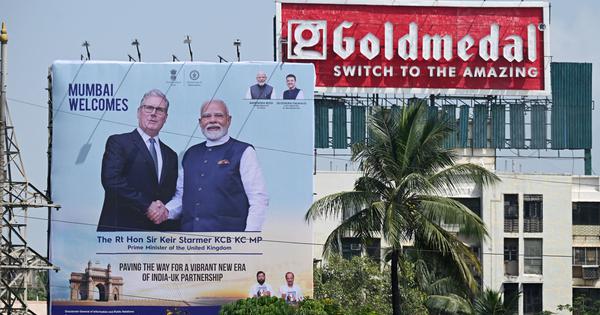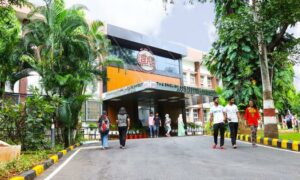
British Prime Minister Keir Starmer will be hoping for positive outcomes as he began his trip to India on October 8 with an entourage which includes business folk and university administrators keen to capitalise on the UK-India Comprehensive Economic and Trade Agreement.
The Free Trade Agreement, as it is known in the UK, was signed earlier this year after almost a decade of stop-start negotiations and missed deadlines.
Arriving in Mumbai, the prime ministerial convoy would have sped southwards across the Bandra-Worli Sea Link and onto the coastal road that skirts midtown. To its right the calm waters of the Arabian Sea and to the left, inland, a forest of cranes and half-built skyscrapers piercing the overcast skies still loaded with the remnants of the monsoon rains.
The commercial capital of the world’s fifth largest economy is a massive construction site at present: Nine metro lines are being built, the coastal road is extending like a spiders’ web northwards to connect the sprawling western suburbs, and across the city, new residential tower blocks and commercial buildings rise like needles on an overstuffed pin cushion. Dust and the sounds of piledrivers and angle grinders are ubiquitous though, no doubt, the ministerial cavalcade would be airtight and sound proofed, to save the visitors from the worst of the city’s terrible pollution – the price of progress.
The iconic Sea-Link bridge and the Brihan Mumbai Corporation Building in Mumbai lit up to welcome PM @Keir_Starmer of UK.
🇮🇳 🇬🇧 pic.twitter.com/ndVYUd5H0Q
— Randhir Jaiswal (@MEAIndia) October 8, 2025
Emerging from the impressive tunnel that now runs under Malabar Hill onto Marine Drive the fleet of cars would have made its way to the Taj Mahal Palace Hotel. Its palatial rooms, corridors and high-ceilinged halls will host two days of briefings, round tables and photo ops, including a meeting with Prime Minister Narendra Modi. India’s ambitious business elites will sit down to dinner with a mix of British diplomats, businesspersons, university vice chancellors and assorted advisors all keen to build their networks.
In the past, many Indian businesses were keen on global expansion and used the UK as a base for growth, but a fast-growing economy and domestic demand mean they are less enthusiastic and happy to focus their energies closer to home. The UK’s appeal is less than guaranteed so Starmer and company have their work cut out.
At home, the Labour government he leads is struggling with low growth and facing unrest over a range of issues which have found their focus in anti-migrant rhetoric and demonstrations. The party’s annual conference last month had plenty of “noises off” as internal critics sharpened their knives.
I’m flying the flag for British business in Mumbai, because growth in India for British businesses means more jobs for people at home. pic.twitter.com/H4TnuTEjQe
— Keir Starmer (@Keir_Starmer) October 8, 2025
The recent announcement of a digital ID scheme was met with vocal resistance which seems to unite folks on both the Left and Right. The so-called “Brit Card” – a distinctly analogue and ungainly branding – is largely seen as a response to mounting pressure from the right-wing Reform Party, which has been successful in conflating immigrants and asylum seekers and stoking anti-migrant sentiment.
The digital ID will be used as proof of the right to work among other things and, therefore, a tool to restrict the activities of illegal immigrants. But many Brits are averse to mandatory ID in principle, fear its reach, and recoil at the collection of personal data by government. Ironically much of their dissent is voiced via social media platforms, which harvest personal data and already use it to pinpoint users with advertising but do not provide much value to citizens. Little commentary focuses on the upside of digital ID and its power to streamline the delivery of public services and eliminate inefficiency in creaking systems such as the National Health Service.
India may have lessons here for the UK.
A session later today on “science, technology and innovation” will provide the 120-plus members of the delegation a chance to hear about India’s successful launch and roll out of a digital ID as part of the massive digital transformation that’s become known as the India stack – a set of open, API-based digital public goods on which a host of services are built.
Bringing tens of millions of formerly unbanked Indians into, or at least in proximity to, the formal economy is one of Aadhaar’s great achievements. Indian designers and entrepreneurs are developing new solutions and services on this stack every day. There is potentially much that Starmer and team can learn from this large-scale experiment.
Britain’s Prime Minister Keir Starmer stands with his business delegation before departing London Heathrow Airport as they head to India to meet with Indian Prime Minister Narendra Modi and promote the recently signed trade deal, in London, Britain.
Source: Pool via REUTERS pic.twitter.com/a82UUfaLDe
— ANI (@ANI) October 7, 2025
Tata Consultancy Services is one of a consortium of Indian companies involved in the roll out of biometric verification and payment solutions in the Aadhaar programme. A visit by the delegation to TCS offices on day two will provide an opportunity to look at the technological underpinnings and no doubt TCS will be making a case for its involvement in the UK’s programme.
TCS already employs more than 23,000 people in the UK, making it one of the country’s largest digital and IT workforces. The Tata Group overall employs more than 60,000 people in the UK. One of the UK’s challenges is a dearth of tech talent, so whether it opens its doors and welcomes Indian engineers or the work is done remotely from Hyderabad or Pune, Indian know-how will contribute to the UK’s digital transformation.
There are 14 universities represented in the delegation. University administrators are desperate to see more Indian students arrive in the UK. The sector is in financial crisis with concerns that prestigious institutes may be on the verge of collapse because the fees paid by domestic students don’t cover their costs. Hefty fees from international students are vital for the sector’s well-being.
We’re honoured to be part of the UK’s largest-ever trade mission to India this week.
This is a great opportunity to build connections and explore opportunities as we get ready to open our new campus in #GIFTCity in 2026, which will bring a globally recognised Queen’s education… https://t.co/ZMnUjQBhQJ
— Queen’s University Belfast 🎓 (@QUBelfast) October 8, 2025
Current immigration rules – unlikely to be loosened given the political pressure from the Right – mean many Indian students are staying away or choosing other places to study. Home Office data shows the number of study visas for Indian nationals dropped by 42% from 159,371 in 2024 to 98,014 as of June 2025.
In response, the universities of Southampton, Liverpool, York, Aberdeen, Bristol and Queen’s University Belfast have said they will establish campuses in India. Some are well advanced. More will be using this trip to look at options and even possible locations among the clusters of shiny new buildings. Vice chancellors will also be pressing Starmer to recognise the huge value – both hard cash and soft power – that the higher education sector contributes and soften the government’s approach on post-graduation work and dependent visas.
Between the briefings and sit downs, delegates will also have the chance to visit sporting and cultural venues including the Wankhede Stadium and the Chhatrapati Shivaji Maharaj Vastu Sangrahalaya museum. Cricket, English language and common legal systems have long been used to make a case for a “shared history” between the two nations: albeit, it is somewhat imbalanced.
‘It is a massive market.’
GB News Political Correspondent Katherine Forster reports from Mumbai as Keir Starmer resists pressure from the Indian Government to allow more highly skilled work visas for Indians going to the UK. pic.twitter.com/aKvgotvENV
— GB News (@GBNEWS) October 8, 2025
Despite some common points of reference, the two nations are culturally very different. A trade agreement takes out some of the friction of doing business. In the case of the CETA, it reduces tariffs, protects intellectual property and goes some way to make professional mobility easier. But ultimately, both sides need high levels of cultural fluency to work together. Success comes when companies develop products and services that meet the needs of customers, citizens and consumers.
Participants at a fintech jamboree at Jio World in the Bandra Kurla Complex, now the city’s central business district, were largely indifferent to the idea that Starmer and his entourage would visit. Where once India sought out the best practice and innovation from abroad and adapted them to the local context, now it is the source of innovation and is increasingly confident in its ability to grow its own.
Almost eight decades after India’s Independence, the balance of power has shifted.
Starmer will hope that in closed door meetings and over canapés and cocktails his team can find common ground with their Indian counterparts and leave with ideas and relationships that will contribute to prosperity in both countries. Both are in urgent need of partnerships that deliver growth.
Mark Hannant is a creative services entrepreneur and author of Midnights Grandchildren: How young Indians are disrupting the world’s largest democracy. He has appeared in two Bollywood films and splits his time between London and Mumbai.
📰 Crime Today News is proudly sponsored by DRYFRUIT & CO – A Brand by eFabby Global LLC
Design & Developed by Yes Mom Hosting






